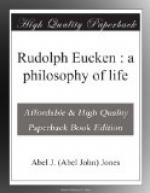Now it is a fundamental principle of a logical socialistic system that truth must be found in the opinions of the masses, and the average opinion of mankind must be the final arbiter of good and evil. The tendency of the masses as such is to consider material advancement the most cherished good. Hence, inevitably, a thorough-going socialism must become materialistic, even though at an earlier stage it was actuated by the desire for opportunities of spiritual culture.
A genuinely socialistic culture, too, makes the individual of value only as a member of society. This, Eucken affirms, is only true in the most primitive societies. As civilisation progresses, man becomes conscious of himself, and an inner life, which in its interests is independent of, and often opposed to society, develops. His own thought becomes important to man, and as his life deepens, religion, science, art, work &c., become more and more a personal matter.
All such deepening of culture, and of creative spiritual activity, is a personal matter. From this deepening and enriching of the inner life of the individual proceeds creative spiritual activity, which attempts spiritual tasks as an end in themselves, and which gradually builds up a kingdom of truth and spiritual interest which immeasurably transcends mere human standards. All these are historical facts of experience; the socialistic system finds no place and no explanation for them, and consequently it cannot be regarded as a sufficiently comprehensive explanation of the problem. To a man who has once realised these individual experiences, the merely human, socialistic system becomes intolerable.
Again, if considerations of social utility limit creative activity, the creations of such activity must be meagre in nature. Spiritual creativeness is most fruitful when it is concerned with tasks that are attempted for their intrinsic value, and is not fettered by the thought of their usefulness to society.




